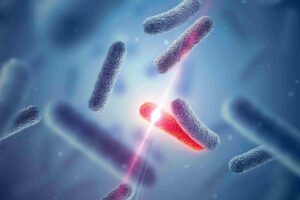• Immune link
• Fetal life
• Early-life colonization
What is already known on this topic
Long before newborns acquire their own microbiota, molecules from symbiotic microorganisms infiltrate almost all of their organs. Adaptations to the microbiota during early life are critical for the host’s development, growth, and immunity.What this research adds
Researchers reviewed studies that looked at the impact of the exposure to microbiota in the early life of mammals. During fetal life and shortly after birth, molecules produced by the maternal microbiota can penetrate the placenta and breast milk, but the effects of these molecules on the developing fetus remain unclear. After weaning, microbial colonization of the intestine exposes the newborn to new antigens, stimulating the full maturation of the immune system.Conclusion
During fetal development and early life, age-specific changes in microbiota composition and immune signaling promote the development of long-term host-microbe interactions.
Scientists have known that animals colonized by microbes are far less susceptible to opportunistic infections than germ-free animals, mainly as a result of the protective effect of the microbiota, which promotes the maturation of the host immune system.
Long before newborns acquire their own microbiota, molecules from symbiotic microorganisms infiltrate almost all of their organs, and adaptations to the microbiota during early life have been shown to be critical for the host’s development, growth, and immunity.
To examine the impact of exposure to microbes in early life, Andrew Macpherson at Bern University Hospital and his colleagues reviewed studies that looked at the interaction between the gut microbiota and their mammalian hosts, from fetal development to the early postnatal period. Their work was published in Science.
Immune link
Many studies have shown that there are precise developmental stages where microbial colonization is critical for normal immune development and the assembly of a healthy microbiota.
Experiments in animals revealed that metabolites produced by the maternal microbiota influence the development of newborns’ immune system as well as the maturation of their gut lining.
The placenta typically limits the fetal exposure to maternal microbial metabolites, and failure to protect the fetus from exposure to these molecules has been proposed to predispose children to metabolic and immunological diseases. For instance, prenatal exposure to lipopolysaccharides, which are found in the outer membrane of some bacteria, can have long-term behavioral consequences in rodents.
Fetal life
A growing number of studies point to the effects of dietary components on the development of the immune system.
Compounds from the maternal diet such as retinoids, whose availability in the gut is regulated by Clostridia bacteria, can influence the development of secondary lymphoid organs in the offspring and predispose newborns to allergies later in life.
Microbial metabolites such as short-chain fatty acids also contribute to host immune maturation. Studies have shown that feeding pregnant mice a diet rich in fibers reduced airway inflammation in the offspring, preventing the development of asthma.
Early-life colonization
After birth, microbial colonization of the body exposes newborns to a range of different microorganisms. In addition, because the maternal microbiota shapes the antibody repertoire of maternal milk, breast-feeding contributes to transfer immune memory from the mother to the offspring.
Once newborns start to consume solid food, the protective effects of milk disappear. At this point, the neonate’s microbes are critical for stimulating a “weaning reaction”. Different mechanisms have been shown modulate the immune system during this transition, although most of them are independent of the microbiota.
After weaning, exposure to new antigens through gut microbes and food contributes to the full maturation of the immune system.
The extent to which the microbes acquired before weaning influence the development of immune cells remains unclear, the authors say. What’s more, the effects of molecules produced by the maternal microbiota on the offspring’s fetal and neonatal life continue to be poorly understood.
However, the authors conclude, it’s clear that during fetal development and early life, age-specific changes in microbiota composition and immune signaling promote the development of long-term host-microbe interactions.











